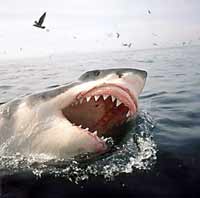Sharks may soon return to Antarctic waters
The global warming brings another surprise for the modern-day world: Antarctic waters become warmer and warmer. Sharks may soon find Antarctic waters suitable for their habitation, which will be very dangerous for local inhabitants. Sharks and other sea predators used to live in those waters, but it was 40 million years ago when water was much warmer in the area. Afterwards, the temperature began to fall, and sharks moved closer to the equator and eventually left the unique natural ecosystem, which continued its evolution without predators for millions of years.

The Antarctic Ocean is covered with ice at a much greater extent than the Arctic Ocean. Its area is larger as well (about 20 million square kilometers), but its depth is inconsiderable (less than 900 meters). Extreme cold and complete darkness made some of its inhabitants the strangest living beings on Earth. Evolution provided their blood with antifreezing proteins, taught them to obtain food from ocean-bottom sand by means of special filters.
Concerns about a possibility for sharks to return to Antarctica was voiced by researchers from the University of Rhode Island who studied metabolism of sharks and other hot-blooded sea predators. They found out that if the temperature of Antarctic waters raises by only several degrees, sharks will come back there.
According to the researchers, sharks have very quick metabolism. In other words, they have to eat much, because they are always in motion to ventilate gills - they need a lot of energy for that. They can stick to this regime only in warm waters, that is why they do not inhabit the cold Antarctica now.
But there are also bottom-dwelling sharks that live at the seabed and swim rather slow. Their metabolism is not so quick and they can live in the water that is only seven or ten degrees (Centigrade) warm. It will be hard for them to leave habitable places and go to the south. But with the global warming and the warming of the Antarctic waters it is inevitable for them and for other oceanic predators, for example, the so-called bony fish, researchers claim.
The Antarctic is quick to warm. Within the last 50 years the average temperature of its waters increased by one-two degrees, which is twice as much as the average speed of the global warming. In another 50 years the Antarctic waters will be appropriate for sharks to live in, and they will return there after a long, but temporary, absence, researchers say.
Antarctica is not very attractive for sharks yet, but other predators seem to be very interested in the new habitat – crabs, for example. Forty million years ago they became extinct together with sharks and other polar predators at the beginning of the Antarctic nip. Now they begin to hunt for creatures that have never been hunted for before. Some crab species already can be found near the very border of Antarctica. Benthic living beings, like gigantic sea spiders, tapeworms and fragile starfish will become easy and helpless prey for crabs.
Scientists fear that this influx of sea predators will disrupt the balance of the ecosystem in the Antarctic waters, and some species will either become extinct or at least dwindle in number.
Nezavisimaya Gazeta
Translated by Julia Bulygina
Pravda.ru
Subscribe to Pravda.Ru Telegram channel, Facebook, RSS!


